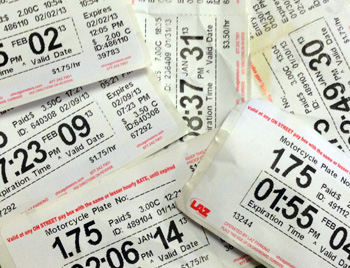| « City Mouse, Country Mouse: Geopolitics and Guns | Genealogy of Scandal in Public Education » |
Op-Ed Tue Feb 19 2013
Parking's a Mess: 45 Tons of Non-Recyclable Stickers

By Scott Robbin & Andrew Huff
The 2008 decision to privatize Chicago's parking meters has always been unpopular. Forget for a moment that they are now the nation's most expensive parking meters, or that Chicago Parking Meters LLC is trying to fleece the city for $22 million dollars. Instead, let's think about the environmental impact of the meters, managed by LAZ Parking. By our estimation, Chicago's parking meters generate nearly 45 tons of unrecyclable trash a year. We'll explain.
First, let's look at the parking receipts themselves -- stickers mounted on plastic-coated paper. The stickers are meant to accommodate the small number of motorcyclists who must affix the receipt to their headlamp. According to the EPA, most stickers cannot be recycled due to the "pressure sensitive adhesive" backing. (One exception being Post-It Notes, which have a lighter coating of adhesive that can be removed in the recycling process.) Similarly, coated paper may or may not be recyclable depending on the coating used. LAZ Parking would not discuss details, citing company policy against sharing "proprietary information."
Now, let's look at the math.
According to an article in Chicago Magazine, the parking meters generated $82.8 million for Chicago Parking Meters LLC in 2011.
19 parking receipts weigh 1 oz.
In 2011, the price of parking ranged from $1.50 to $5 an hour.
Assuming that the average parking meter purchase was $3:
$82.8 million in revenue ÷ $3 average purchase = 27.6 million receipts printed
27.6M ÷ 19 receipts per ounce = 1,452,632 ounces
1,452,632 ounces = 45 tons
Of course, this is just an estimate; LAZ Parking would not comment on the actual number of receipts generated. To calculate the true amount, we'd either need to know the number of receipts issued per year, or an accurate average purchase price. If the average purchase were $2.50, it would equal 33.1 million meter receipts and about 54.5 tons of waste.
Regardless of the margin of error, it is clear that the parking meters have a negative environmental impact, albeit one that could be easily addressed.
Department of Streets & Sanitation spokesperson Anne Sheahan says the department collects about 100 million tons of garbage a year, and 55,000 tons of recyclable material. So while 45 tons is a drop in the garbage bucket, it's still a significant source of trash.
Although Sheahan says the department "has not received reports from field staff indicating parking meter receipts as a problematic form of litter," it's not uncommon to find receipts in gutters, on sidewalks and elsewhere on city streets. Judson Picco of Horner Park says, "I expect to see, at minimum, one discarded sticker on the pavement every time I park in a meter zone."
Scattered debris or not, the meter receipts are adding to the amount of trash generated by our city. If Chicago Parking Meters LLC and LAZ won't reverse the unpopular decision to privatize the meters, they can certainly take steps to win back public support by becoming conscientious participants in keeping our city clean and green.
The first step in this direction would be to switch the printing of parking receipts from stickers to paper; or rather, switch them back. In early 2010, LAZ had experimented with printing lightweight thermofax paper, but favored changing over to adhesive-backed receipts to cater motorcycle and scooter riders. Other cities, such as Albany, New York, have resolved similar issues by offering discounted plastic tag holders.
Cities like Cedar Rapids and Milwaukee have implemented ticketless solutions, allowing residents to pay for numbered meter spots. The multi-space pay station, known as LUKE, caters to traditional payment systems, like coins and bills, while also looking towards the future, accepting smartphone payments.
The simplest solution, though, may be for LAZ to switch to recyclable paper and work with the City to ensure that recycling containers are located near parking pay stations.
~*~
Scott Robbin is a web developer living in Chicago. Andrew Huff is editor and publisher of Gapers Block.












gal / February 19, 2013 11:23 AM
"The simplest solution, though, may be for LAZ to work with the City to ensure that recycling containers are located near parking pay stations."
wait, i thought the stickers are not recyclable? so how is that the simplest solution?